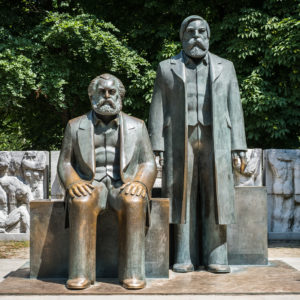In the first half of the 19th century, England began to industrialize. Rapid innovation led to strong economic growth and dramatic increases in output per worker, but for nearly 50 years, wages remained almost unchanged.
This gap in income and social opportunity — known as “Engels’ Pause” because it is the focus of an 1844 essay by Karl Marx’s intellectual partner Friedrich Engels — fueled the emergence of Marxism and contributed to the series of revolutions, coups and civil conflicts that characterized the second half of the century in England, France, Germany and other European countries.
Historical analogies can be misleading, but this gap between productivity and wages is strikingly similar to the evolution of productivity and wages in the United States over the last 40 years. The current level of income inequality has significant potential to destabilize any democracy, as former Treasury Secretary Hank Paulson said during the George W. Bush Presidential Center’s recent Forum on Leadership.
You can witness the effect of our modern age of rapid innovation and change in any number of ways. You can see it in the disruption that artificial intelligence and robotics are having on once rock-solid economic models. And you can see it in the technological advances that allow scientists to edit genes to prevent heart disease and other congenital conditions.
These kinds of innovation, like the ones that drove early industrialization two centuries ago, are doing more than just introducing new products and eliminating old ones, or opening new opportunities to work and eliminating old ones. They are changing the very nature of work, creating new relationships between worker and employer, and disrupting communities as people move in search of opportunity.
This type of change is more profound than simple introduction of a new technology. A new economic paradigm like the one whose emergence we are witnessing ripples through society, changing power relationships, changing the nature of government, even touching relationships between men and women, parents and children, ethnic groups and faiths.
Moreover, as in Europe in the 19th century, these developments are rearranging international power relationships. China, for one, is emerging as an industrial power, and this is having disruptive effects on the United States and other advanced economies. India, Brazil, Nigeria and others are industrializing, which is creating new power relationships throughout the world. The stakes are high, given the implications of Germany’s quest for a place among the great nations a century ago.
The rest of the story of Engels’ Pause is that the yawning gap between productivity and wages that developed in the first half of the 19th century lessened in the second half, as education and training caught up and the labor force became more sophisticated and better adapted to the demands of the new technologies. By 1900, wages in England were again rising at the same pace as output per worker. But social and international conflict continued for another half century, as Germany, Russia, China and other countries grappled with their own “Engels’ Pauses.”
As an economist and — yes, as a globalist — I have a lot of confidence in the entrepreneurial spirit of Americans. I think we will find a new path to growth, upgrade our workforce’s skills, and ultimately the wage-productivity gap will close.
I see harbingers of this outcome whenever I visit an innovative, nimble company applying new technological solutions to reducing costs and competing in an unforgiving global market. Or a university full of smart, vigorous people of all ages wrestling intelligently with tough problems and, often in multi-ethnic, -generational, -national and -gender teams, coming up with answers nobody expected.
But can we wait 50 years for our own Engels’ Pause to be overcome? Or are we condemned to repeat the last century’s experience of social and international conflict?
We are a great and sovereign nation, and we hold our fate in our own hands. Smart policy that deals forthrightly with the realities of the global market and geopolitics, that is driven by a vision that sees over the horizon of the moment, can make the difference. May we have the wherewithal to learn from the mistakes of the past.

